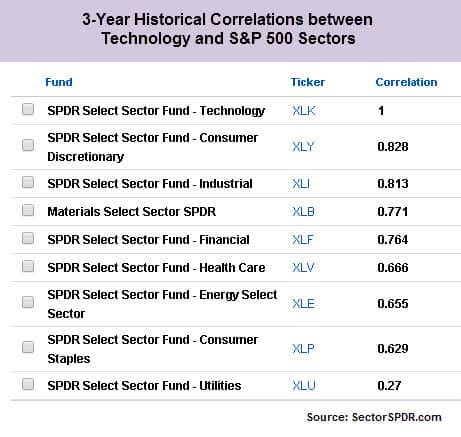Market correlations explain to us the similarity in performance and behavior by different types of assets.
For investors, correlation comparisons might be between two commodities (NYSEARCA:DBC), two stocks, a stock and a commodity, or even a stock and an index. Should correlations be used to make investment decisions?
Over the past three years, the Technology Sector SPDR ETF (NYSEARCA:XLK) and Apple (NasdaqGS:AAPL) have had a 0.58 correlation. That means a 1% increase by either, would imply a 0.58% gain by the other. The more positive the correlation between assets, the more likely both are to move in the same direction.
(Audio) Ron DeLegge Analyzes and Grades a $381,000 Retirement Plan
Correlation comparisons can also be applied at the industry sector level too.
For example, the Consumer Discretionary Sector (NYSEARCA:XLY), is the most highly correlated sector to (0.82) to S&P 500 technology stocks (XLK) over the past three years. (See table below) On the other hand, utilities (NYSEARCA:XLU) and consumer staples (NYSEARCA:XLP) have had the lowest correlation to tech stocks among the nine S&P 500 sectors over that same period.
At times, correlations can be negative.
For instance, if an asset has a -1 correlation, it means that a 1% gain by another asset or market would imply a 1% loss. And a zero correlation means there’s no statistical relationship between two assets or markets.
Correlations between assets will sometimes be casual, complimentary, parallel, or reciprocal. Yet, these relationships are in constant flux each day and never remain the exact same.
During extreme market conditions, correlations that seemed to exist between two assets can suddenly vanish and correlations that didn’t seem to exist can suddenly appear. And that’s precisely why making future investment decisions based solely upon historical correlations can be misleading. Because the future is never quite the same as the past.
Follow us on Twitter @ ETFguide
